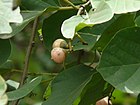Note: This is a project under development. The articles on this wiki are just being initiated and broadly incomplete. You can Help creating new pages.
Cordia dichotoma - Uddalaka
Uddalaka is a moderate sized decidious tree with big oval leaves and rooping branches. The fruits are very sticky and mucilaginous and are edible.
Contents
- 1 Uses
- 2 Parts Used
- 3 Chemical Composition
- 4 Common names
- 5 Properties
- 6 Habit
- 7 Identification
- 8 List of Ayurvedic medicine in which the herb is used
- 9 Where to get the saplings
- 10 Mode of Propagation
- 11 Cultivation Details
- 12 Commonly seen growing in areas
- 13 Photo Gallery
- 14 References
- 15 External Links
Uses
Wounds, Diarrhea, Irritable Bowel Syndrome, Burning sensation, Indigestion[1]
Food
Uddalaka can be used in Food. Tender leaves are used as vegetable. Unripe fruits made into pickle and ripe fruits eaten raw[2].
Parts Used
Chemical Composition
The fruits contain Ca 55, P 275, Zn 2, Fe 6, Mn 2, Cr 0.2 and Cu 1.6 mg/100 g (Chromium is of therapeutic value in diabetes). Antinutritional factors are—phytic acid 355, phytate phosphorus 100 and oxalic acid 250 mg/100 g.
Common names
| Language | Common name |
|---|---|
| Kannada | Challe, Challe hannu |
| Hindi | Lasora, Bada Goonda |
| Malayalam | Naruvari, Naruveli |
| Tamil | Cavarittakikam, Jollai |
| Telugu | Bankanakkera, Bankiriki |
| Marathi | NA |
| Gujarathi | NA |
| Punjabi | NA |
| Kashmiri | NA |
| Sanskrit | Bahuvarah, Bauvaraca |
| English |
Properties
Reference: Dravya - Substance, Rasa - Taste, Guna - Qualities, Veerya - Potency, Vipaka - Post-digesion effect, Karma - Pharmacological activity, Prabhava - Therepeutics.
Dravya
Rasa
Tikta (Bitter), Kashaya (Astringent)
Guna
Snigdha (Slimy), Guru (Heavy)
Veerya
Sheeta (cold)
Vipaka
Karma
Pitta, Vata, Kapha
Prabhava
Nutritional components
Uddalaka Contains the Following nutritional components like - Vitamin- C; Calcium, Iron, Manganese, Magnesium, Phosphorus, Potassium, Sodium[2].
Habit
Identification
Leaf
| Kind | Shape | Feature |
|---|---|---|
| Simple | Alternate | Leaves simple, entire and slightly dentate, elliptical-lanceolate to broad ovate with a round and cordate base. Variable in size and shape |
Flower
| Type | Size | Color and composition | Stamen | More information |
|---|---|---|---|---|
| Polygamous | Axillary or terminal in corymbose panicles | White to cream | 5 | Calyx 6mm long, ribbed, lobes 5, dentate ,not recurved, corolla 8mm aross, lobes 5, recurved. |
Fruit
| Type | Size | Mass | Appearance | Seeds | More information |
|---|---|---|---|---|---|
| A drupe | Ovoid, cream coloured, mucilaginous, supported by accrescent calyx | Seeds solitary | {{{6}}} |
Other features
List of Ayurvedic medicine in which the herb is used
Where to get the saplings
Mode of Propagation
Cultivation Details
Cordia dichotoma is available through February to March[2].
Season to grow
Soil type
Propagation
Commonly seen growing in areas
Photo Gallery
References
- ↑ Uses
- ↑ 2.0 2.1 2.2 "Forest food for Northern region of Western Ghats" by Dr. Mandar N. Datar and Dr. Anuradha S. Upadhye, Page No.63, Published by Maharashtra Association for the Cultivation of Science (MACS) Agharkar Research Institute, Gopal Ganesh Agarkar Road, Pune
- ↑ Vernacular names
- ↑ BOTANIC DESCRIPTION
- ↑ Ayurvedic preparations
External Links
- Ayurvedic Herbs known to be helpful to treat Wounds
- Ayurvedic Herbs known to be helpful to treat Diarrhea
- Ayurvedic Herbs known to be helpful to treat Irritable Bowel Syndrome
- Ayurvedic Herbs known to be helpful to treat Burning sensation
- Ayurvedic Herbs known to be helpful to treat Indigestion
- Herbs with Bark used in medicine
- Herbs with Fruits used in medicine
- Herbs with common name in Kannada
- Herbs with common name in Hindi
- Herbs with common name in Malayalam
- Herbs with common name in Tamil
- Herbs with common name in Telugu
- Herbs with common name in Sanskrit
- Habit - Tree
- Index of Plants which can be propagated by Seeds
- Herbs that are commonly seen in the region of Tropical area
- Herbs
- Tree
- Boraginaceae





